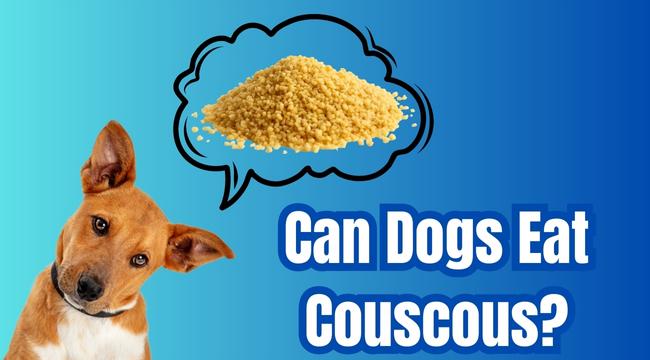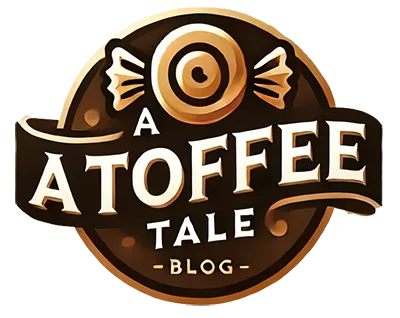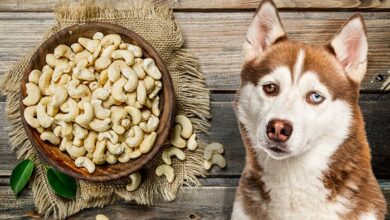Is Couscous Safe for Dogs? What You Need to Know at 2024

Welcome to the world of couscous—an ancient grain that’s not only delicious but also steeped in rich cultural heritage. In this introduction, we’ll uncover the essence of couscous, exploring its origins, diverse types, and how it’s enjoyed across different cultures.
Across different regions, it has evolved into distinct types such as Moroccan, Israeli, and Lebanese , each with its own characteristics and culinary uses. Moroccan couscous, for instance, is known for its fine texture and is often paired with savory stews like tagine. Israeli couscous, also called pearl couscous, has a larger, rounder shape that lends itself well to salads and pilafs. Lebanese couscous, on the other hand, is larger in size and commonly used in soups and as a base for hearty dishes.
Join us as we delve deeper into the world of couscous, uncovering its cultural significance, exploring its various types, and discovering how this humble grain has become a beloved staple in kitchens worldwide.So let’s explore that-can dogs eat Couscous?
Nutritional Profile of Couscous
Couscous offers a diverse nutritional profile that can contribute beneficially to both human and canine diets. Here’s an overview of its macronutrient content, micronutrients, and a comparison with other grains and grain alternatives:

Macronutrient Content:
- Carbohydrates: It is primarily composed of carbohydrates, providing a good source of energy. It contains complex carbohydrates, which are broken down more slowly in the body, providing sustained energy levels.
- Protein: While not as high in protein as some legumes or animal-based sources, it does contain moderate levels of protein. This makes it a valuable addition to meals, especially when combined with other protein sources.
- Fat: It is very low in fat, which can be beneficial for dogs that require a low-fat diet due to health concerns like pancreatitis.
Micronutrients:
- Vitamins: It contains several B vitamins, including thiamine (B1), niacin (B3), and folate (B9), which play essential roles in energy metabolism, nerve function, and overall cellular health.
- Minerals: It is a good source of minerals such as iron, magnesium, phosphorus, and selenium. These minerals are important for bone health, muscle function, and overall cellular processes.
Comparison with Other Grains and Grain Alternatives:
- Versatility: It is versatile in cooking and can be prepared in various ways, similar to rice or quinoa.
- Digestibility: Some dogs may find couscous easier to digest compared to whole grains like brown rice or oats, though individual tolerance can vary.
- Nutritional Diversity: It provides a different texture and flavor profile compared to traditional grains like wheat or corn, offering variety in meal preparations.
It presents a balanced nutritional profile suitable for both humans and dogs when prepared and served appropriately. Its carbohydrate content provides energy, while moderate protein levels and essential vitamins and minerals contribute to overall health. When considering its inclusion in your dog’s diet, always monitor their response and consult with a veterinarian to ensure it aligns with their specific nutritional needs and dietary requirements.
Potential Benefits of Couscous for Dogs
It can offer several potential benefits for dogs when incorporated into their diet in moderation. Here are the key advantages:
Source of Energy from Carbohydrates:
- Energy Supply: Couscous is predominantly composed of carbohydrates, which are essential for providing energy to fuel your dog’s daily activities and metabolic processes.
- Sustained Energy Release: The complex carbohydrates in couscous provide a gradual release of energy, helping to maintain steady blood sugar levels and sustained activity throughout the day.
Possible Digestive Benefits from Fiber:
- Promoting Digestive Health: Couscous contains dietary fiber, which supports healthy digestion by promoting regular bowel movements and maintaining gut health.
- Feeling of Fullness: Fiber can contribute to a feeling of fullness, which may help prevent overeating and support weight management in dogs.
Providing Variety in Your Dog’s Diet:
- Nutritional Diversity: Including couscous in your dog’s diet adds variety to their meals, which can increase their enjoyment of food and encourage healthy eating habits.
- Texture and Flavor: Couscous offers a different texture and flavor compared to traditional dog foods, making meals more interesting and satisfying for your dog.
Incorporating It into your dog’s diet can provide nutritional benefits such as energy from carbohydrates, potential digestive support from fiber, and overall dietary variety. However, it’s essential to introduce it gradually and monitor your dog’s response to ensure they tolerate it well. Always consult with your veterinarian before making significant changes to your dog’s diet, especially if they have specific health conditions or dietary restrictions. By doing so, you can ensure that couscous contributes positively to your dog’s overall health and well-being.
Risks and Precautions When Feeding Couscous to Dogs
When considering feeding It to dogs, it’s important to be aware of potential risks and take necessary precautions to ensure their health and well-being. Here are the key risks and precautions to keep in mind:
Risk of Allergies or Intolerances:
- Potential Allergies: Dogs, like humans, can develop allergies to grains, including It. Signs of an allergic reaction may include itching, redness, swelling, or gastrointestinal upset such as diarrhea or vomiting.
- Individual Sensitivity: Each dog may have a different tolerance level to grains, so it’s essential to introduce couscous gradually into their diet and monitor for any signs of allergic reactions or intolerances.
Digestive Issues Such as Bloating or Gas:
- Digestive Sensitivity: Some dogs may experience digestive issues when introduced to new foods, including couscous. Symptoms can include bloating, gas, or changes in bowel movements.
- Gradual Introduction: To minimize digestive upset, start with small amounts of cooked plain couscous and observe how your dog responds before increasing the portion size.
Importance of Serving Plain, Unseasoned Couscous:
- Avoiding Harmful Ingredients: Seasonings, additives, salt, butter, or oils commonly used to flavor couscous for human consumption can be harmful to dogs. These ingredients may lead to digestive upset, pancreatitis, or other health issues.
- Plain Preparation: Cook It plain without adding any seasonings or additives. Serve it in its natural state to ensure it remains safe and suitable for your dog’s digestive system.
Monitoring and Adjustments:
- Observation: Pay close attention to your dog’s behavior and health after introducing couscous. Monitor for any adverse reactions and adjust their diet accordingly if needed.
- Consultation with Veterinarian: Before adding couscous or any new food to your dog’s diet, consult with your veterinarian. They can provide guidance tailored to your dog’s specific nutritional needs and health conditions.
By being aware of these risks and taking necessary precautions, you can safely introduce couscous into your dog’s diet as an occasional treat or supplemental source of carbohydrates. Always prioritize your dog’s health and well-being by making informed decisions and seeking veterinary advice when needed.
Proper Ways to Serve Couscous to Your Dog
When serving couscous to your dog, it’s essential to do so in a way that ensures their safety and enjoyment. Here are the proper ways to serve It to your dog:
Recommended Portion Sizes Based on Dog’s Size and Activity Level:
- Small Dogs (up to 20 lbs): Start with 1-2 tablespoons of cooked couscous per meal.
- Medium Dogs (20-50 lbs): Begin with 2-4 tablespoons of cooked couscous per meal.
- Large Dogs (50+ lbs): Introduce 1/4 to 1/2 cup of cooked couscous per meal.
Adjust portion sizes based on your dog’s individual needs, activity level, and overall dietary requirements. Couscous should be considered a supplemental treat rather than a primary source of nutrition.
Mixing Couscous with Other Dog-Friendly Ingredients:
- Plain Preparation: Cook It plain without adding salt, spices, butter, oils, or other seasonings that could be harmful to your dog.
- Combine with Protein: Mix cooked It with lean proteins such as boiled chicken, turkey, or fish. This adds essential amino acids and complements the carbohydrates from couscous.
- Add Vegetables: Incorporate dog-friendly vegetables like steamed carrots, green beans, or peas to provide additional fiber, vitamins, and minerals.
Avoiding Harmful Additives and Seasonings:
- Read Labels: Avoid packaged It mixes that contain additives, preservatives, or seasonings that may be harmful to dogs.
- Natural Ingredients: Stick to plain, unseasoned couscous to ensure it remains safe and beneficial for your dog’s digestive system.
By following these guidelines, you can serve It to your dog in a way that enhances their diet while prioritizing their health and well-being. Always introduce new foods gradually and monitor your dog’s response to ensure they tolerate it well. Consult with your veterinarian before making significant changes to your dog’s diet, especially if they have specific health conditions or dietary restrictions. With proper preparation and moderation, couscous can be a nutritious addition to your dog’s meals and provide variety in their diet.
Veterinary Insights and Recommendations
Based on veterinary insights and recommendations, here’s a summary of the consensus on feeding couscous to dogs, signs to watch for adverse reactions, and final thoughts on its inclusion in a balanced canine diet:
General Veterinary Consensus on Feeding Couscous to Dogs:
- Nutritional Value: Veterinarians generally agree that it can be a safe and nutritious addition to a dog’s diet when prepared plain and served in moderation.
- Moderation: It should be considered a supplemental treat rather than a primary source of nutrition due to its carbohydrate content. It can provide energy and variety in meals when included appropriately.
- Digestibility: Some dogs may find It easier to digest compared to other grains, but individual tolerance can vary. It’s important to introduce couscous gradually and monitor your dog’s response closely.
Signs to Watch for If Your Dog Reacts Poorly to Couscous:
- Allergic Reactions: Symptoms may include itching, redness, swelling, or gastrointestinal upset such as diarrhea or vomiting.
- Digestive Issues: Watch for signs of bloating, gas, or changes in bowel movements, which could indicate difficulty digesting it.
- Behavioral Changes: Monitor for any changes in behavior or energy levels that could suggest an adverse reaction to it.
Final Thoughts on Couscous as Part of a Balanced Canine Diet:
- Variety and Enjoyment: Including It in your dog’s diet can provide variety and enhance mealtime enjoyment.
- Portion Control: Recommended portion sizes should be based on your dog’s size, activity level, and overall dietary needs. Always adjust as necessary to maintain a healthy weight.
- Consultation with Veterinarian: Before introducing it or any new food, consult with your veterinarian. They can provide personalized advice based on your dog’s health status, nutritional requirements, and any existing dietary restrictions.
In conclusion, it can be a beneficial addition to your dog’s diet when served plain, in moderation, and with careful monitoring for any adverse reactions. By prioritizing your dog’s health and consulting with your veterinarian, you can ensure that couscous contributes positively to their overall well-being and dietary diversity.




